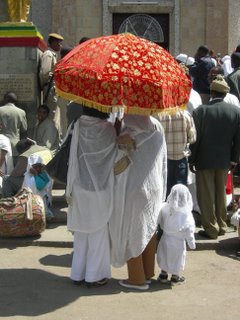A week ago, CNN and BBC were plastered with news of escalating conflict in the Horn of Africa, with Ethiopia’s troops still in Somalia and the United States’ attempts to catch terrorists with bombs. But what have you heard about the county I currently call my home this week? Nothing. Yet, this week, a story just as news worthy has stormed the city of Addis Ababa: the African Union Summit. All weekend, roads have been closed off and police line the streets to ensure safe arrival to the likes of Ban Ki Moon (the new UN Secretary General), African presidents such as Bashir or Mugabe, and, perhaps with slightly less security, the continent’s policy makers.
I crave a mainstream media source that will give the same type of coverage and attention to this meeting as they have to the World Economic Forum in Davos this past week. I know it’s been said before- Africa is sidelined and pigeon holed in the media, where only stories of conflict and disaster grab the global spotlight- but it wasn’t until I arrived here that I realized just how much action is happening on the ground. I feel that without media attention, the outcomes of this type of meeting will not be supported to successful action. Put the spotlight on Africa, not just for more aid and new initiatives run by Western donors, but for support of sophisticated indigenous action that is already taking place.
CPAR is involved in this type of action on a smaller scale, working within NGO groups to increase its coverage, scale up its projects, and provide more integrated interventions. At the moment, it’s working with CANGO (a consortium of Canadian NGOs) to multiply its work around Dibate and Bullen in one of Ethiopia’s most developmentally isolated regions, contributing its experience and expertise to a project that, as a small NGO, CPAR wouldn’t have the capacity to implement on its own.
Monday, January 29, 2007
Monday, January 22, 2007
Timket Celebrations in Addis Ababa
One of the biggest celebrations of the Ethiopian Orthodox Church is Timket, or Epiphany. This weekend, the streets were full of Ethiopian Christians following the march of Ark of the Covenant replicas around Addis Ababa.
 Timket crowds following the Ark of the Covenant
Timket crowds following the Ark of the Covenant
 Three women in Ethiopian traditional clothes
Three women in Ethiopian traditional clothes
 A little Ethiopian dressed in traditional clothes
A little Ethiopian dressed in traditional clothes
 Ethiopian Orthodox Clergy and the Ark of the Covenant
Ethiopian Orthodox Clergy and the Ark of the Covenant
 Timket Ceremony at Medhane Alem Church
Timket Ceremony at Medhane Alem Church
 Timket crowds following the Ark of the Covenant
Timket crowds following the Ark of the Covenant Three women in Ethiopian traditional clothes
Three women in Ethiopian traditional clothes A little Ethiopian dressed in traditional clothes
A little Ethiopian dressed in traditional clothes Ethiopian Orthodox Clergy and the Ark of the Covenant
Ethiopian Orthodox Clergy and the Ark of the Covenant Timket Ceremony at Medhane Alem Church
Timket Ceremony at Medhane Alem Church
Thursday, January 11, 2007
African Homecoming
It is with many apologies for a prolonged blog absence that I come back online after my East African vacation. Over the past three weeks, I've travelled through Uganda, Kenya and Tanzania, making it as far as Zanzibar off the East coast of the continent. Relaxed and with visa, I am back at my desk in the CPAR office in Addis Ababa.
While my trip was a vacation, it got me thinking a lot about Ethiopia's unique development situation in the continent. Never having been colonized, the differences between Addis and somewhere like cosmopolitain Nairobi are immediately apparent. Everything from the prices, the infrastructure, and the goods available had me feeling like I was in a North American suburb. Looking farther, past the material goods and shiny billboards, even the representations of poverty and the attitudes towards foreigners were different in all three countries as compared with Ethiopia. These differences made me realize just how self-directed the action within this country is, with society and government making things up as they go along, rather than taking an example from other nations. Now that I've realized this, I'll try to think about it more, looking for the ways in which Ethiopians are innovating their own futures, both on an individual and societal level.
As the plane touched down at the airport in Addis, I found myself bouncing in my seat, happy to be home.
While my trip was a vacation, it got me thinking a lot about Ethiopia's unique development situation in the continent. Never having been colonized, the differences between Addis and somewhere like cosmopolitain Nairobi are immediately apparent. Everything from the prices, the infrastructure, and the goods available had me feeling like I was in a North American suburb. Looking farther, past the material goods and shiny billboards, even the representations of poverty and the attitudes towards foreigners were different in all three countries as compared with Ethiopia. These differences made me realize just how self-directed the action within this country is, with society and government making things up as they go along, rather than taking an example from other nations. Now that I've realized this, I'll try to think about it more, looking for the ways in which Ethiopians are innovating their own futures, both on an individual and societal level.
As the plane touched down at the airport in Addis, I found myself bouncing in my seat, happy to be home.
Subscribe to:
Comments (Atom)